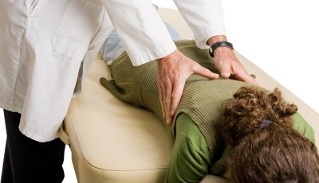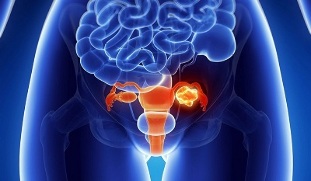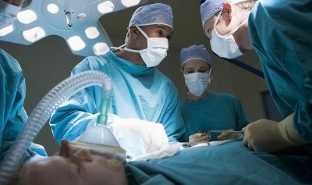
What is lumbar osteochondrosis? How to treat lumbar osteochondrosis? Is it true that osteochondrosis is not treated at all?
Considering the incidence statistics, the number of cases per year will not decrease. Vertebral osteochondrosis affects young organisms and the elderly. The neuropathologist or osteopath will explain in detail how to treat lumbar osteochondrosis and the main symptoms of lumbar osteochondrosis.
Osteochondrosis is a fairly common disease. Discomfort refers to changes in the shape of vertebrae and decreased elasticity of intervertebral discs due to cellular dystrophy.
The lumbar spine is affected for a reason. In the lower part of the spine, the vertebrae bear the greatest load. When lifting weights, all the forces acting on the body fill the intervertebral space, which can cause nerve root compression. From here, signs of lumbar osteochondrosis began to appear.
Reason
Every disease has predisposing factors that negatively affect the body. Lumbar osteochondrosis also has its own causes. Doctors did not rule out the cause and transmission route of the disease at the genetic level. It is believed that if parents have the problem of intervertebral disc malnutrition, then this problem is likely not to bypass the child. One of the most popular reasons is manual labor. When lifting weights, most of the load will flow to the lumbar s spine.
Obesity is an equally common cause of disease. The excess weight accumulated in the body puts pressure on the spine and causes pain. It seems that the change of posture will not lead to serious consequences, but this is also one of the reasons for the wear of the intervertebral disc, which can become rickets. Back injuries are very important. Contusions, well-trained athletes lifting heavy objects or choosing incorrect loads can also have adverse effects.
The most common cause of damage to the nutrition of intervertebral disc cells is a sedentary lifestyle.
In order to maintain good health, one needs a moderate burden. Limited or complete lack of physical exercise can cause a decrease in blood circulation. As a result, the back muscles that do not receive the necessary nutrients will become weaker, and the burden on the lumbar spine will increase. Moreover, over the years, the spine has become less mobile like young people, and the elasticity of the intervertebral discs is reduced, leading to the disease.
Infectious diseases or inflammation affecting bones or joints can cause changes in the structure of the vertebrae. Congenital skeletal deformities, or deviations in the development of the musculoskeletal system. Flat feet, due to the lack of shock absorption in the limbs, cause damage to all parts of the spine. Most of the load is not on the legs, but on the lower back, which causes segmental deformation. The common cause of various diseases is stress. Therefore, lumbar osteochondrosis and its symptoms are no exception. Strong nerve concussion can be used as a power to pinch nerve endings and cause painful attacks. Stress is usually the cause of osteochondrosis in women, and they are more emotionally agitated than men.
Symptoms
Doctors rarely diagnose the initial stage of the disease. Therefore, it is difficult to determine the main symptoms of lumbar osteochondrosis. The manifestations of the disease occur gradually.
Since the main manifestation is low back pain, the pain is divided into 3 groups, which in turn characterizes the symptoms and signs of low back pain.
- Low back pain-Paroxysmal pain caused by sudden exercise or weight lifting. When trying to adopt other postures, the pain will increase until low back pain.
- Lumbodynia-The pain worsens and becomes regular. Muscle fibers and intervertebral cartilage are affected. Low back pain is the result of low back pain.
- Waist and hip pain-Pain in the waist and lower limbs, cold or hot. They are produced by squeezing the root of the spinal cord.
The second most important symptom in diagnosing a disease is restricted physical activity due to pain. When trying to do something by yourself or get used to exercise, a person will experience increased pain, which affects the entire leg. Even in a sitting position, the patient will feel a tingling sensation from the lower back to the feet.
Also important is the local decrease in temperature and the discoloration of the skin, which becomes dry and pale. Numbness and weakness of the lower limb muscles indicate the development of the disease. The most serious phenomenon is manifested in the final degree of lumbar osteochondrosis, which is pelvic organ dysfunction. Persistent debilitating pain is accompanied by stool and urinary incontinence, and vice versa, delayed excretion.
When diagnosing diseases, lumbar spine osteochondrosis is divided into four stages. For each stage, the symptoms of lumbar osteochondrosis are characteristic, and the pain on the bone also increases.

As the disease progresses, osteochondrosis can descend to the final spine, the tail bone. This disease is called the osteochondrosis. There was severe paroxysmal pain in the tailbone area. In this case, women suffer the most. Their anatomy and age-related changes contribute to the development of intervertebral disc chondropathy. Osteochondrosis in women is usually complicated by other medical diseases.
There are some differences between the symptoms of lumbar osteochondrosis and lumbar osteochondrosis.
Symptoms manifest as pelvic organ dysfunction, making it difficult to choose the correct treatment and diagnose the cause of the disease.
Signs of frequent urination, urinary incontinence and fecal incontinence. If the diagnosis is incorrect, complications will occur.
Stage of the disease
The treatment of lumbar osteochondrosis is also different from the stage of the disease.
- The firstis also the initial stage of the disease, which is characterized by the manifestations of lower back pain-low back pain, muscle cramps, local swelling of the skin.
- Phase 2The stage begins with low back pain. Compared with the initial stage, the pain has become more regular and intense. In the joints of the spine, abnormal movements may occur, which can increase pain. Pain is felt along the sciatic nerve. Less commonly, the function of internal organs may be impaired.
- The third stageis characterized by the appearance of intervertebral hernia. Deformation of the spine, the curvature can be left or right, this is scoliosis, forward-lordosis, backward-kyphosis. Therefore, constant severe pain will torture a person.
- Fourth stageThe most difficult. Due to the constant severe pain, the patient has difficulty exercising. If treatment is not started on time, a person may become permanently disabled.
Complications
The most common complication is dysfunction of the genitourinary system. Along with urinary incontinence, urine and feces, inflammation occurs in the urogenital organs and rectum. As vertebral lesions become more pronounced, the irritation occurs in the direction of the sciatic nerve and its inflammation. A herniated disc is a very dangerous complication. Herniation is a critical state of the intervertebral disc. If treatment is not started on time, it may cause the next complications. It occurs due to degenerative changes in the spine.
The result of herniation is a herniated disc. This is reflected by the change in its shape and the rupture of the intervertebral disc membrane.
Continuous compression and inflammation of the nerve roots of the spinal cord can cause complications such as radiculitis.
may completely block the spinal canal. Due to the instability of the waist s area, men have congestion in the small pelvis, leading to impotence. In women, this can lead to inflammatory diseases of the uterus, ovaries and appendages. From the side of the kidney, this is renal colic, which can only be eliminated after treating the osteochondrosis of the lower back. Paralysis of the lower limbs can confine a person to a wheelchair. Timely diagnosis and timely treatment of lumbar osteochondrosis can help prevent these complications and avoid disability.
Treatment
Let's check the lumbar osteochondrosis, symptoms and treatment. In modern times, medicine can recover people suffering from osteochondrosis. It takes a long time to treat osteochondrosis of lumbar ac. Patients suffering from intervertebral disc osteochondrosis for the first time still wonder whether osteochondrosis can be cured and how to eliminate it forever?
What should I do? Is lower spine osteochondrosis treated? First, you need to completely rethink your lifestyle. Draw certain conclusions. You need to move towards achieving the goal of uninterrupted daily healing. For lumbar osteochondrosis, comprehensive treatment of the disease is very important. The treatment of lumbar osteochondrosis includes several methods.
conservative
Conservative treatment based on massage techniques, if performed correctly, can relieve muscle spasms and improve muscle fiber nutrition. The corset that can strengthen the back muscles by improving the sense of nutrition. Take the correct posture, which determines the appearance of various spine problems. Physical therapy for lumbar osteochondrosis is very useful, but during the worsening period, you need to exercise during the remission period. In the acute phase of the disease, you will only aggravate the condition and damage your health.
Manual therapy also refers to conservative therapy. It should be performed by professionals trained in this technology. Thanks to this therapy, the spine can be restored to the desired position. Sometimes this is the most effective method. It is necessary to perform this operation in the subacute period.
Diet, obese people, living a healthy lifestyle and sticking to healthy eating habits will not harm anyone. People with this disease will only benefit. Because of being overweight, this is one of the causes of osteochondrosis. Physical therapy is equally effective therapy. Magnetic therapy, UHF can treat for a long time and improve blood circulation in the affected area of lumbar osteochondrosis. They also have vasodilatory and analgesic effects.
Type of medication. How to treat lumbar osteochondrosis with drugs? What kind of treatment should be adopted, all these questions are of great interest to a patient. There are two types of treatment. In the first case, in the acute phase of disc osteochondrosis, the drug is designed to eliminate pain and inflammation. A method of releasing spinal nerve root contraction is used. These include muscle relaxants, glucocorticoids, blockades, and non-steroidal anti-inflammatory drugs. During the second attack, the drug is used to improve blood circulation, restore muscles and nerve fibers, and damaged body tissues between the worsening. For this purpose, vitamins and preparations of animal and plant origin are used.
In order to improve blood circulation, vascular preparations and warming and anesthetic ointments are used.
running

Neurosurgeons perform microsurgery and endoscopic surgery on the spine.
These methods are more common, and if other processing fails, delete them.
If the effect of the drug treatment has not been achieved, and complications such as hernia occur, surgical removal of the affected intervertebral disc is required.
Disease prevention
The prevention of lumbar osteochondrosis is to eliminate the risk factors that cause the disease. In order not to consider how to treat lumbar osteochondrosis, you need to prevent it from happening. Eliminating the cause is the main preventive measure.
Normal physical activity strengthens the back muscles, prevents the lumbar spine from bearing the maximum load, and prevents the development of diseases that cause osteochondrosis. All of these are preventive measures to prevent the symptoms of lumbar osteochondrosis. By following these simple principles, you will stay healthy and live longer. After all, if you do not follow treatment and preventive measures, you may never be able to regain your life.



































